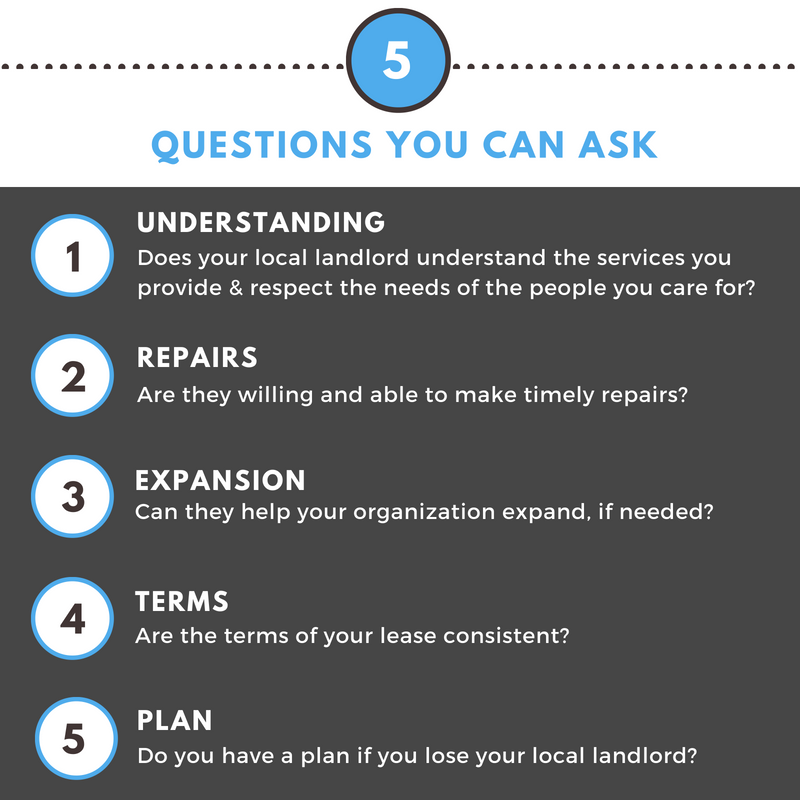If your company has made the decision to lease, rather than own, your community-based home(s), you likely understand the importance of having a solid and open relationship with your landlord. Some providers are fortunate enough to be working with an amazing local landlord … but many don’t have such luck. How does your experience measure up? Here are 5 questions you can ask yourself to determine the quality of your experience—and how we can help improve things if your needs are not currently being met.
Question #1: Does your local landlord understand the services you provide and respect the needs of the individuals being cared for—particularly when it comes to modifications?
Unfortunately, local landlords don’t always understand the services being provided in a community-based home. This means they may not understand, or may actively try to prevent, the necessary modifications that must be made for the individuals being served in the home. Many local landlords do not want the home to be tinkered with and provide considerable resistance to any modifications being made—regardless of the need for the individuals who live in the home.
Why CapGrow Is Different: We focus exclusively on providing safe, secure and appropriate housing for individuals with behavioral health needs. We completely understand the priorities of our providers and are fully committed to supporting any modifications that must be made to ensure the individuals living in each home are safe and comfortable. We can also finance the expense of any necessary modifications and roll the additional payment into the lease rate.
Question #2: Is your local landlord willing and able to make timely repairs?
Local landlords can sometimes be unwilling to handle agreed-upon repairs, arguing the issues don’t fall under a “typical” lease agreement. Whether their avoidance is due to a lack of necessary funds or a disagreement over who is responsible for what, the end result is a negative impact on residents.
Why CapGrow Is Different: We customize our lease agreements to work for each specific provider and how they operate. Our goal is a partnership built on great communication, and we will take on as much (or as little) responsibility as each provider requests.
Question #3: Can your local landlord help your organization expand when needed?
When an organization has been asked to open additional homes, providers need to be able to move rapidly to identify properties, modify them and allow individuals to move in. Many local landlords are unable to access or raise capital as quickly as needed, which hinders expansion and leaves potential residents waiting.
Why CapGrow Is Different: We pride ourselves on flexibility and speed when finding the appropriate home for our partners. We have access to unlimited funding and can act on a “hot lead” immediately. This means that you can get the exact home you want and meet your expansion goals, without worrying about raising money or dealing with banks.
Question #4: Are the terms of your lease consistent (especially if you own more than one home)?
For providers who manage several homes, it can be difficult to juggle multiple leasing agreements—each with their own terms, pricing, rules and even multiple landlord relationships. What’s allowed at one home may not be at another, and not all landlords look at the world the same way. A lack of consistency across leases can create many management challenges.
Why CapGrow Is Different: We customize our lease agreements to meet the operational needs of each of our partners. By creating a strategic relationship with us, your organization benefits from a streamlined process wherein you work with just one housing partner, while retaining the ability to tailor solutions for each home.
Question #5: Do you have a plan in place if you lose your local landlord?
Let’s say you’re one of the lucky people we mentioned earlier who has a great landlord and a solid working relationship. It may be worth asking yourself: What you would do if your landlord decided to sell decided to get out of the leasing business? What would happen to your community-based homes and, more importantly, the people living there?
How CapGrow Can Help: We understand how important consistency and familiarity can be to individuals with behavioral health needs. If you find yourself in a situation where your current landlord needs to break the relationship, we can purchase the property and re-establish your lease so there is no disruption to the individuals you serve.
To find out how CapGrow can help you with your current needs or to learn more about our customizable lease solutions, contact Alexis Budge or visit our website.
